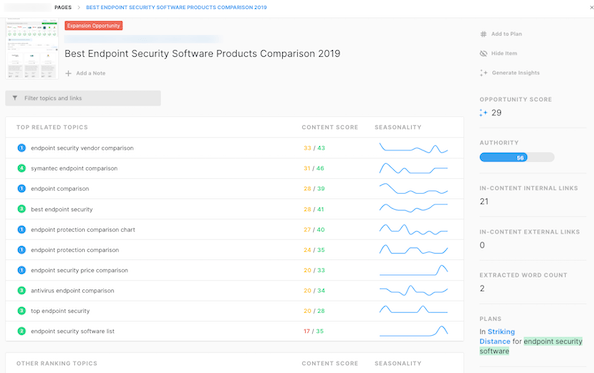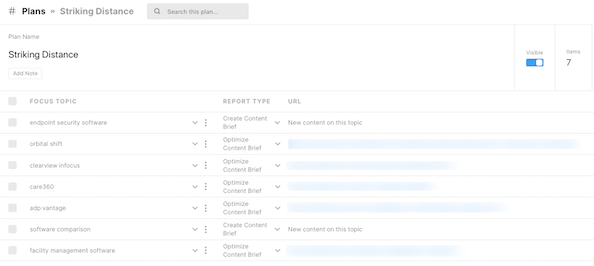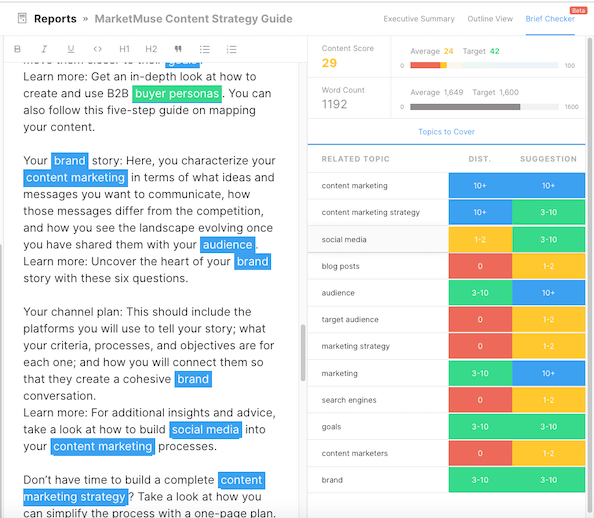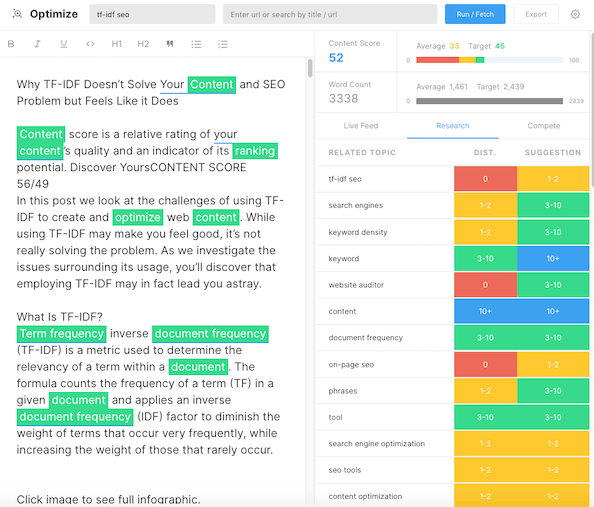How to Get the Most out of Ahrefs With MarketMuse
Ahrefs is a great SEO tool that many content marketers use for keyword research. MarketMuse is a content intelligence platform with a strong emphasis on content. Take those keywords you find in Ahrefs and use MarketMuse to turn them into expert-level content at scale.
Let’s look at how you can use Ahrefs and MarketMuse together. First we’ll examine a couple of ways you can use Ahrefs’ tools for keyword research. If you have a favorite workflow, skip ahead to the part where we discuss how MarketMuse can help create the most comprehensive content.
Site Explorer
Site explorer offers a number of ways to explore not only your site, but that of your competitors. Here’s a few ways how you can take advantage.
Organic Keywords Report
This report shows the keywords for which any domain or subdomain or subfolder ranks. You can use this report in a number of ways.
See Competitors’ Top Keywords
Use the report to determine the keywords that are sending the most organic traffic to your competition. These keywords may be worth targeting. You can exclude branded keywords for cleaner data that’s easier to review.
See Competitors’ Low Difficulty Keywords
The competitions’ top keywords may be too highly competitive. In a case like this, many users employ filters to isolate keywords that have low difficulty scores with reasonable volume.
However, there are a couple of reasons to be wary of using keyword difficulty and search volume as metrics.
- Keyword difficulty is not a personalized metric. According to the score, a website about tropical fish will have as much trouble ranking for the term “user intent” as this blog does. Intuitively, that doesn’t make any sense at all.
- A well-written comprehensive page will rank for many keywords. The search volume for those keywords can far outweigh the traffic brought by one targeted keyword. So you can miss out on some potentially lucrative search engine traffic when you ignore search terms with low volume.
Use SERP Overview for More Detail
One way to overcome those issues (at least within Ahrefs) is to use the SERP overview. This shows the top 10 ranking pages along with some SEO metrics. Here are some features to look for:
- Pages with few or no referring domains
- Pages with weak backlink profile (low URL rating)
- Pages on websites that have weak backlink profile (low Domain Rating)
- Pages that are full of user-generated content (forum posts)
Find Striking Distance Opportunities
Optimizing content can often bring faster returns that creating content from scratch. Use a combination of position and volume filters to find these keywords.
Pages ranking for keywords in the second page of the SERP, particularly those near the top, offer great potential. Frequently, a slight improvement is all that’s required to bump it up to the first page of the SERP. The increase in traffic can be quite substantial.
Content Gap Analysis: Ahref vs. MarketMuse
Good content strategy requires a deep understanding of your strengths and weakness compared to the competition. One way to accomplish this is through content gap analysis.
Ahref and MarketMuse take distinctly different approaches to finding content gaps. Consequently, the results are dramatically different.
MarketMuse creates a topic model of important concepts surrounding a specific topic. It’s important to note that this is a semantic model. Topics appear in the model because they are semantically related, NOT because they appear in the SERP. This is an important distinction that we’ll come back to.
MarketMuse evaluates the top 20 pages in the SERP to determine what topics these pages are missing. It also offers insight into how frequently these terms are used (that’s the way in which an expert would use these terms).
The MarketMuse topical model reveals 50 semantically related concepts that should be included in an article on that topic. In the partial screenshot below the red square indicate content gaps while colored square indicate frequency of usage (yellow 1- 2 times, green 3 – 10 times, blue 10+).

Ahrefs simply compares the ranking between two or more items (up to a maximum of 10). There is no topic model driving the comparison.

As a result you get an incomplete picture of the gaps that exist in your content.
Content Explorer
Content explorer offers a number of nice features that help content strategists with competitive research. There’s a monthly trend of pages over time, showing the number published and updated for a given search term.
High competition keywords generally see many sites publishing or updating their content in an effort to rank well for that term. Seeing this data historically gives you insight into whether the competitive forces are still active.
Plus, there’s a list of pages that appear in the SERP for the search term showing the date published and updated, domain rating, number of referring domains, organic traffic, traffic value, and number of social shares (Twitter, Facebook, Pinterest). One click brings up historical information on these details.
Keywords Explorer
Keyword Explorer holds a wealth of information about a specific search term. It’s here where you will discover search volume, keyword difficulty, the number of clicks on a search result, paid advertising cost per click (CPC), distribution of clicks between paid and organic, SERP position history, and SEO metrics for top 10 ranking pages (Ahrefs ranking, domain ranking ,URL ranking, backlinks, domains, traffic, keywords, top keyword, volume).
This report is also a place to get more keyword ideas. There’s a list of keyword phrases incorporating the same term, search queries that are phrased as a question, and all keywords for which the top 10 pages for that search term rank.
Keyword Generator
The Ahref keyword generator is another way to come up with a list of keywords to target. There are six different algorithms to pick form, or you can get keywords from all the methods combined.
- Phrase match – Get keyword ideas that include an exact match with the keyword (phrase).
- Having same terms – Keyword ideas that contain the seed keyword in any order.
- Also rank for – Looks at the pages ranking for the search term, and finds all the other keywords for which these pages rank.
- Search suggestions – These are the terms that appear in Google’s autocomplete when the search query is typed.
- Newly discovered – Phrase match keywords that were recently added to the Ahrefs database.
- Questions – A list of search queries phrased as a question.
Turning a List of Keywords Into Content (at Scale)
Now that you have a list of keyword candidates, the challenge lies in turning those topics into content, at scale. MarketMuse Suite, the content intelligence and strategy platform is designed to do exactly that.
1. Add Missing Keywords to MarketMuse Suite
MarketMuse Suite maintains an updated inventory of page and topics (keywords) associated with your site. This happens as part of the onboarding process where MarketMuse conducts a site audit to create a topic model of your website.
You’ll have an inventory of the topic of which each page ranks, but also those topics for which the site can potentially rank. So there’s a good chance the topics in which you’re interested are already in MarketMuse Suite. If not, you can add them manually.
2. Prioritize Topics in MarketMuse Suite
Using Ahrefs, you may have already set a priority for the keyword in your list. Like most content strategists, that may involve keyword difficulty and search volume. For the reasons already discussed, I suggest you use MarketMuse to add another perspective.
MarketMuse Opportunity score is a composite score that evaluates the urgency and overall likelihood of success in creating and optimizing content on a particular topic.
Opportunity Score takes hundreds of factors into account, including:
- Content Quality
- Content Comprehensiveness
- Search Volume
- Topical Authority
- Site Authority
- Competition
- Variants
- Relevance
- Current Coverage
That score provides a better indication of the potential for success since it’s personalized your site and its inventory.
Opportunity Score is a value calculated for all topics (keywords) in the inventory. Any topics added are automatically evaluated so there’s no additional work on your part.

So it makes sense to double-check your list of Ahrefs candidates to make sure they are your best opportunity.
3. Evaluate for Optimization or New Content Opportunity
Examining this list of keywords in MarketMuse Suite will quickly reveal if any existing pages already rank for some of these terms. Just because a page ranks in the SERP doesn’t mean it’s an automatic candidate for optimization. Looking at the inventory card, you’ll be able to see if it ranks higher for a more appropriate search term.
Look at the top related page for that term to ascertain the best plan of attack. Either you optimize the existing page for that topic or create new content.

For every page in inventory, MarketMuse shows the related topics for which that page ranks, plus its position in that SERP. If the topic appears in the Top Related Topics section, it’s a good optimization contender.
4. Add Candidates to the Plan
During the evaluation process, it’s best to add candidates to a plan within MarketMuse Suite. Plan are used to organize, track and execute the required tasks.
This example plan contains keywords (topics) from Ahref that were evaluated in MarketMuse Suite. Every plan is different. Yours may have both Create Content Briefs and Optimize Content Briefs, as shown in the plan below.

Sometimes it’s better to optimize an existing piece of content. At other times, creating a new content item is the best approach. These reports can be ordered from with the plan and virtually anywhere within MarketMuse Suite.
5. Provide Writers With MarketMuse Content Briefs
A MarketMuse Content Brief is your path to crafting the best content and optimizing existing pages. Each brief provides:
- Questions that your content should answer. Those are the ones your audience is asking.
- Engaging article title suggestions, including terms whose usage can set yourself apart.
- Subheading suggestions including suggested terms.
- Relevant subtopics to include and their suggested distribution – so the writing seems natural and performs well in search.
- Internal linking recommendations that create authoritative content clusters.
- External linking recommendations that aren’t in direct competition with your content, yet help your article to be seen as trustworthy and definitive.
MarketMuse Create Content vs. Optimize Content Briefs
MarketMuse Create Content and Optimize Content briefs provide the same information with one important difference. Create content briefs start from a clean slate since the content does not exist.
Optimize Content briefs take into account the existing content on a page. So if you’ve already covered a particular subtopic, it won’t appear as a suggestion.
Give your writers these MarketMuse Content Briefs to ensure the content they create is the most comprehensive available on the web. The writer can check their article using the Brief Checker to confirm they covered all the important related topics.

6. Data-Driven Content Optimization and Review
Having the best content on the web requires more than just editing for spelling and grammar. But quality is no longer a subjective measure. MarketMuse uses data to turn this metric into something objective. Using the Optimize App, you can ensure the material submitted is of the highest quality, covering all relevant subtopics.

If the writer follows the brief and checks their work in the Brief-Checker, all that’s necessary is to verify their blog post. Using keyword research conducted in Ahrefs and the insights gained through MarketMuse, you’ve created some of the best content on the web!
Use Ahrefs and MarketMuse to Augment Your Content Creation and Optimization Efforts
Ahrefs is an SEO tool adored by many in the content marketing space. But helping to create comprehensive content isn’t its forte. Use their software to identify the keywords you want to target, but don’t stop there.
Use MarketMuse to craft expert-level content at scale and increase your performance in organic search. After all, who doesn’t want higher rankings?
Stephen leads the content strategy blog for MarketMuse, an AI-powered Content Intelligence and Strategy Platform. You can connect with him on social or his personal blog.